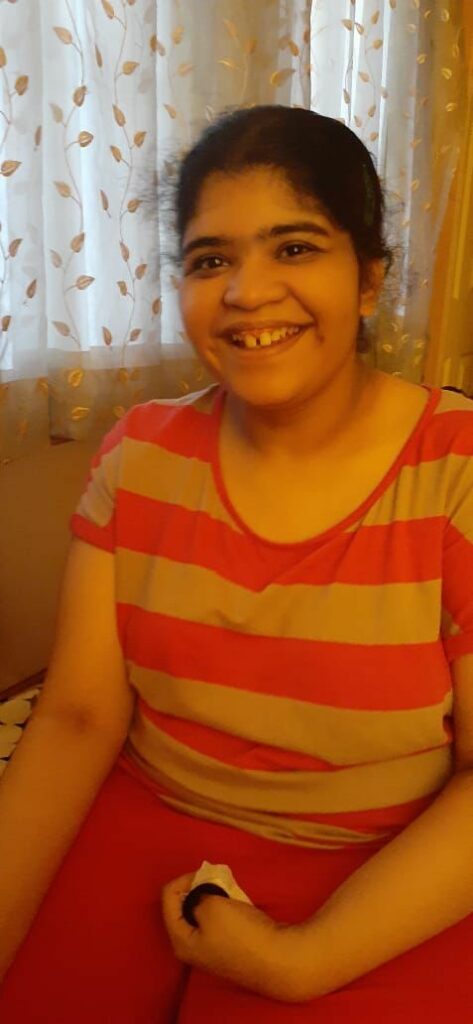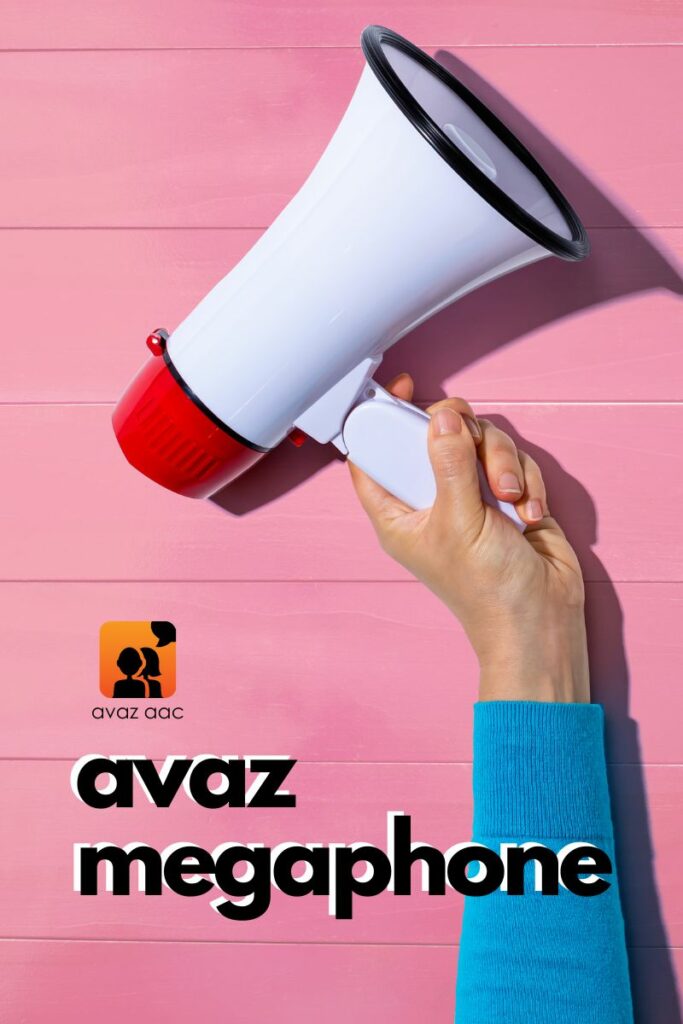

Being able to communicate their mind makes a world of difference to those on the autism spectrum. When there are obstacles to communication, their overall quality of life and mental health takes a toll. This is compounded by people around them misunderstanding them.
In certain situations, communication is the difference between access to education and a life full of uncertainty. It is what allows wings of hope to grow. In some cases, it is the only thing that allows children the audacity to dream. Read this short story by Aditi to get a sense of how this works.
This short story is an Avaz Megaphone feature.
Selvi’s Predicament
Selvi signed the circular sent by the principal with an air of resignation. She had been watching Muthu flap his hands like a bird and spin around like a top on the school ground. All things considered, today was a good day. After all, Muthu was not screaming or rolling on the floor of the classroom.
Most of the children who came to this Government Primary School in Chennai, India, were children of daily wage labourers and construction workers. It was a big deal for them to send their children to school and not to work at a construction site.
The teachers did their best to work around the students’ difficulties. But they were overworked – and the lack of resources was a real problem. This was compounded by the teachers’ limited understanding of the different developmental and learning difficulties that young children could have.
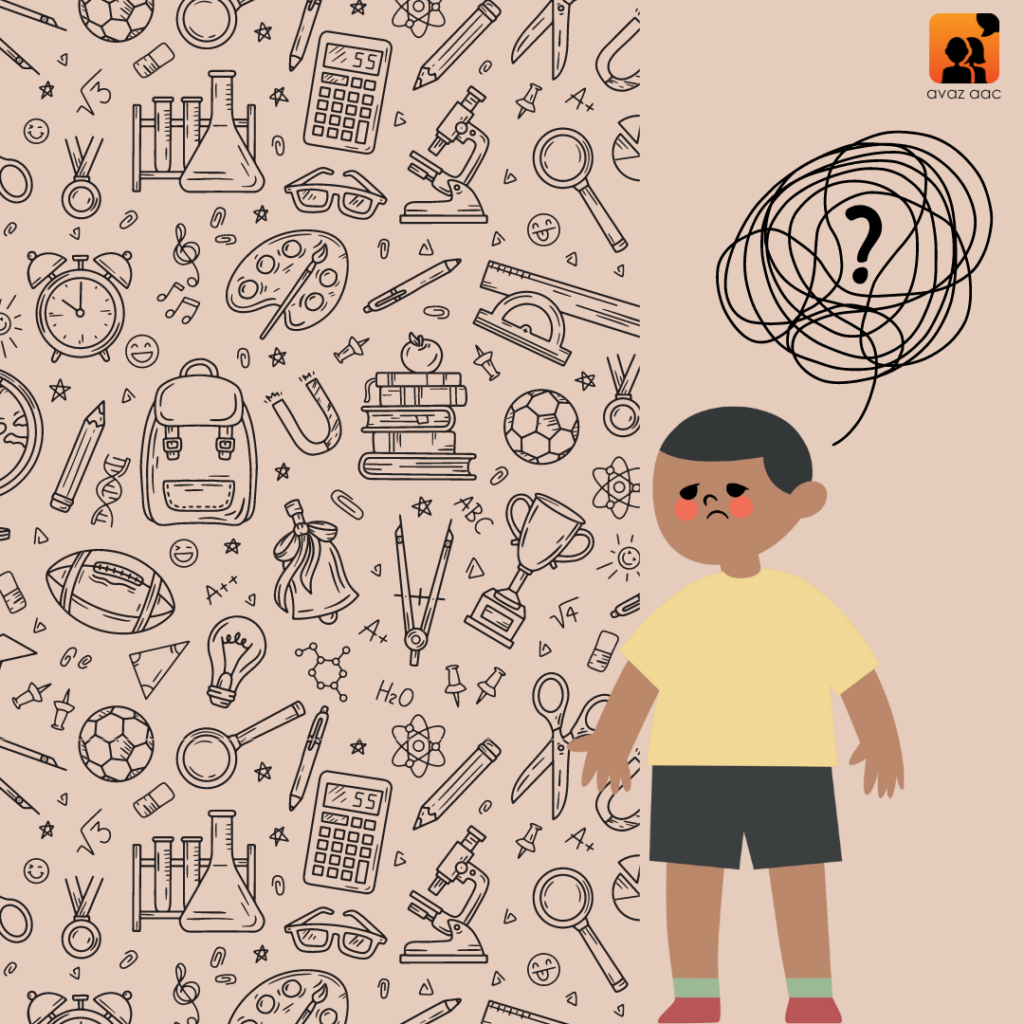

Muthu’s World
Muthu – he was a different ballgame altogether. All of 8, he lived in his own world – never bothering to respond to people calling out his name. He never looked people in the eye nor would he answer any questions. He kept repeating questions asked of him, just like a parrot. Keeping him in the classroom was a huge challenge. Just when you thought he was okay, he would shut his ears and start screaming. Attempts to get him to write usually ended in him screaming his head off. And rolling on the floor.
Ms. Revathi, the government appointed special educator, had evaluated Muthu on one of her school visits. She had found that he was on the autism spectrum. It was the first time Selvi was hearing such terms. As Muthu’s class teacher, she researched it on the internet. The description online matched Muthu to a T!
Seeking Solutions
Selvi had been quite determined to help Muthu even before suspecting his autism. His father was forever threatening to stop sending him to school. He wanted Muthu to start cleaning cars in the apartment complex nearby and do other odd jobs to earn money. “What is the point in sending him to school” was his father’s constant refrain. “Let him at least earn some money and not be a burden on us!”
Selvi just did not know how to help this little boy!
“Muthu, class-ku po“, Selvi says to Muthu in Tamil, asking him to go to class.
Muthu stopped spinning for a brief moment. He repeats “Class-ku po” without so much as looking at Selvi and went back to spinning rapidly. Selvi began to wonder if Muthu even understood what people were trying to tell him. A part of her wanted to believe that he could understand but lacked the ability to respond appropriately. If only she had a way of figuring it out …
Selvi walked on to the Principal’s office . The circular mentioned that they had an important visitor and the Principal wanted to discuss something with her. Curious as to what important business the visitor might have, she decided to go right away.
A Serendipitous Meeting
“Vanakkam Sir”, greeted Selvi as she walked into the principal’s office. “What did you want to talk to me about?” As she took her seat, she noticed a well dressed woman already seated in one of the chairs facing the Principal.
“Vanakkam Selvi!” replied the Principal. “Under a government program, our school is getting two tablets loaded with an app called Avaz AAC. I believe it is useful for autistic children. Perhaps we can try it out with some of our students.” She continued, “I called you mainly to meet Ms. Lalitha who is here today. She works with the company that makes Avaz. I felt that you can get a better understanding of this app from her.”
Selvi was getting excited. “Apps for children like Muthu?”, she exclaimed. “I am so glad to meet you Ms. Lalitha – I definitely want to know more about this Avaz! One of my students was recently evaluated for Autism, but I don’t know how to help him. I don’t even know if he understands what I am trying to tell him.”
Expanding Horizons
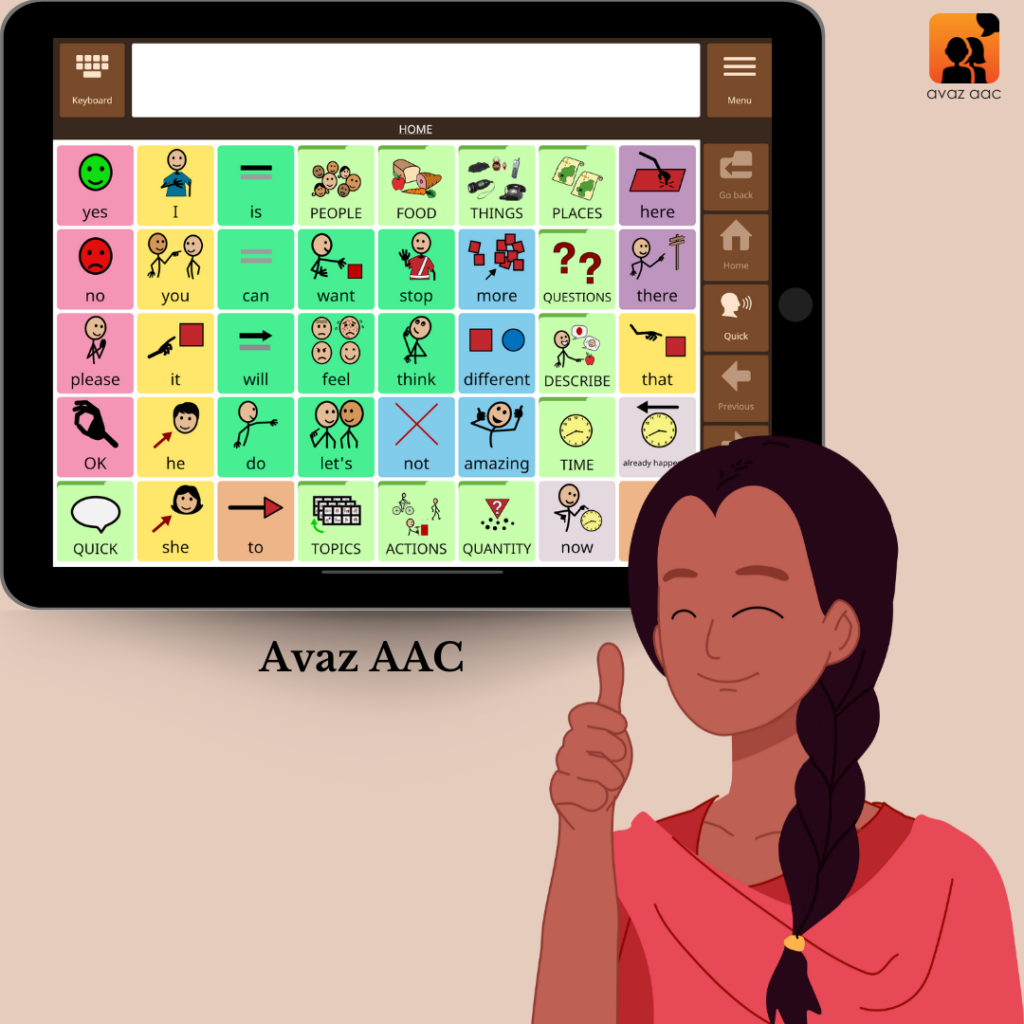

“Nice to meet you Selvi”, said Lalitha, “What do you know about autism so far?”
“Actually, I don’t know much about autism”, replied Selvi. “One of our students, Muthu, is very different from any child who I have seen so far. He is eight. When we call him, he does not respond – even though he can hear pretty well. He refuses to look anyone in the eye. He is always in his own world and keeps moving his hands and body in a weird manner . When we ask him something , he parrots the question back but does not give a reply. All of a sudden, he shuts his ears and starts screaming loudly and if you ask him to write, he bangs his head and begins rolling on the floor. He was recently evaluated for autism.”
“I am glad that he has been evaluated.” began Lalitha. “Autism Spectrum Disorder or ASD is a developmental disability that can cause significant social, communication, and behavioral challenges – just like what you described.”
Lalitha continued, “In autistic people, their senses react very differently to the environment. Speaking like you and I do can be very difficult for them. The sensation of being in a class with all the noises, the instructions and even holding a pencil or writing can be overwhelming. But they can be given other ways to communicate and learn. This is where Avaz app can support them.”
A Teacher Learns
Lalitha loaded Avaz and gave the tab to Selvi. “What we have here is a picture-based communication system. When we ask a child a question, we can teach the child to respond appropriately by choosing from the picture options. The app will speak out the chosen option. Basically, the app will speak for the child.”
Selvi slowly browsed through the categories and pictures in each of the folders. She realised that it was very comprehensive and included most communication needs of a young child.
“As you can see,” continued Lalitha, “The pictures are fairly intuitive. The child does not necessarily have to know reading to begin using the app. Each of the pictures has the corresponding word as well and this will help build reading skills.”
There was a keyboard on the screen that Selvi was curious about. Lalitha replied, “This keypad is similar to the keyboard on a computer or a phone. Children who are adept at reading and spelling can simply type to communicate.”
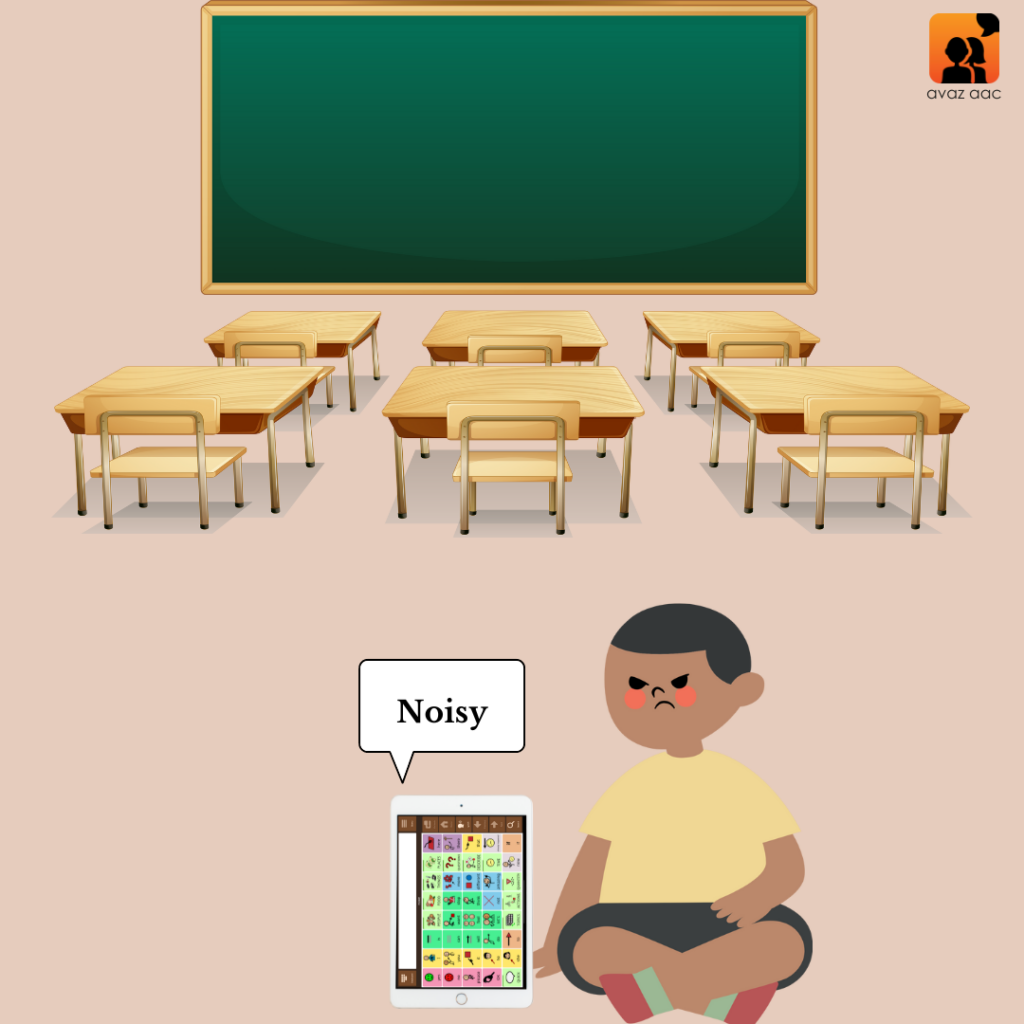

Selvi began to feel hopeful. Maybe this was the solution she was looking for. She decided that she would teach Muthu to communicate using the app. Even if it meant she had to put in extra time to learn to navigate the app!
Wings of Hope
Nine months later:
Muthu was spinning rapidly like a top on the school ground on a warm spring morning. Selvi walked up to him, device in tow.
“Enna aachu?”, she asked. “What happened? Why are you not in the class?”
“Why are you not in class?”, he repeated.
Selvi held the tab out with Avaz loaded. Muthu took the tab and chose the picture ‘NOISY’.
‘Come, let’s sit below the tree and read’, said Selvi as she led Muthu to sit under the canopy of the large peepal tree. On Avaz, she him the picture of an elephant with the words ‘elephant’, ‘rabbit’ and ‘pig’ written below and asked Muthu, “What is this ?”
Muthu looked at the screen from the corner of his eye and tapped the word ‘ELEPHANT’
“Good job”, exclaimed Selvi as she held her palm out for a high five. Muthu gave her a high five and began to grin. His impish smile lit up his huge, sparkling eyes.
Muthu’s journey from isolation to communication through Avaz is a powerful reminder of the pivotal role communication plays in the lives of children with speech difficulties. Avaz app coupled with Selvi’s unwavering dedication showcases the transformative potential of early intervention. As parents, caregivers, and educators, we must recognise that with nurturing and innovative approaches, we can empower children like Muthu, to find a voice of their own.
Avaz Megaphone is a platform for neurodivergent individuals to express themselves through the written word. We accept opinion pieces, short stories and poetry. Authors of accepted works will receive an honorarium. To make a submission please email us on: [email protected]
WRITTEN BY
Aditi Sowmyanarayan
Student & Writer
Aditi Sowmyanarayan is an eighteen year old who uses Avaz, a text to speech app, to communicate. She goes to Ishanya India Foundation, a special school in Bengaluru. Aditi is an avid blogger and an aspiring writer. She blogs on www.smallstepbigthought.blogspot.com
She can be reached on Instagram at writeaditi and on her Facebook page : small step big thought
